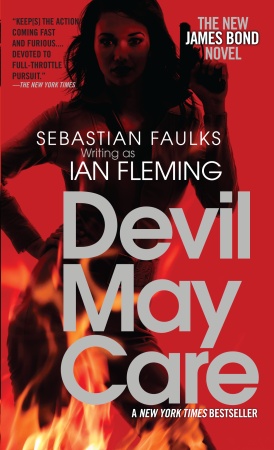 On today's menu; spies and intrigue, with a side of 1960s glamour.
On today's menu; spies and intrigue, with a side of 1960s glamour.I like James Bond. Hell, I want to be James Bond. I want to romance women and kill henchmen and foil schemes for world domination. I live vicariously through my television whenever a Bond film is on, and will willingly sit through every single one of them again and again. Yes, even A View to a Kill, wherein the now-octogenarian secret agent seduces a twenty-something woman who is saddled with the intellect of a sub-literate teenager, and the talent of a wedge of cheese (read: Tanya Roberts, my vote for the worst Bond lady ever, with Denise Richards a close second).
The books? It's not that I'm against them, but my interaction with them is far more limited. It's beyond argument that the movie Bond is now a far cry from the literary Bond, although the best Bond films always tend to hew toward the books' meaner and more streamlined spy antics.
But as to the books, I've only read three of Ian Fleming's efforts, and a later John Gardner when I was a wee teen. I enjoy them, sure, and admire Fleming's surety of his craft, but I'm not as driven to them as to the more immediately visceral films.
So I approach Devil May Care without a lot of the baggage the more Fleming-aquainted reader may bring. I've also never read Sebastian Faulks, but I am aware of his reputation as a writer, and I was intrigued as to how he would fashion his more 'literary' skills to mingle with the pulp sensibilities of Flemings master creation.
The result? Surprisingly fun, if a little off.
Faulks' Bond, taking after the last of Fleming's novels, is an older, slightly wiser take on the secret agent. The 1960s are winding down, Vietnam is on the horizon, and the moral turpitude of Britain's young is under the devastating threat of cheap drugs. Bond, after a forced sabbatical, is brought back to investigate Dr. Gorner, a maniacal drug dealer with a rare disorder that has given him the large, hairy hand of a monkey. I kid you not. Along for the ride is Scarlet Papova, the obligatory woman/conquest who gets under Bond's hide. And as he uncovers the dastardly scheme - a baroque plan involving warheads and vengeance - Bond finds himself set far deeper in the fiendish plot than he could have anticipated.
Faulks, while closely adhering to Fleming's streamlined style, works more of a 21st sensibility into the proceedings. Fairly absent is the casual racism that marred Fleming's works, a product of their time that always left me a little queasy. Faulks' take on the secret agent shows a little alteration as well. This Bond is slower to anger, more aware of others. Less of a sociopath, I'd guess you'd say, and a little closer to the movie Bonds in spirit. This has its good points and less-than-good points. Part of the real appeal of the literary manifestations of Bond was how absolutely ruthless he was, ruthlessness of a level rarely seen in the films - although Quantum of Solace (highly and unfairly regarded as a lesser Bond, in my opinion) was likely the closest we've come to seeing Bond as the conscience-absent machine of the novels. Seeing Bond develop feelings for Scarlet was a crack in his emotional armour that may have signified a new growth and maturity for the uber-spy, but felt false.
Faulks, while closely adhering to Fleming's streamlined style, works more of a 21st sensibility into the proceedings. Fairly absent is the casual racism that marred Fleming's works, a product of their time that always left me a little queasy. Faulks' take on the secret agent shows a little alteration as well. This Bond is slower to anger, more aware of others. Less of a sociopath, I'd guess you'd say, and a little closer to the movie Bonds in spirit. This has its good points and less-than-good points. Part of the real appeal of the literary manifestations of Bond was how absolutely ruthless he was, ruthlessness of a level rarely seen in the films - although Quantum of Solace (highly and unfairly regarded as a lesser Bond, in my opinion) was likely the closest we've come to seeing Bond as the conscience-absent machine of the novels. Seeing Bond develop feelings for Scarlet was a crack in his emotional armour that may have signified a new growth and maturity for the uber-spy, but felt false.
But there's enough derring-do, mayhem, and hissable villainy on display to make up for this shortcoming. Devil May Care may be, in the end, a minor Bond, but as with the movies, minor Bond is still a hell of a lotta fun.
Verdict: MONKEY LIKES


1 comment:
nice use of moral turpitude.
Post a Comment